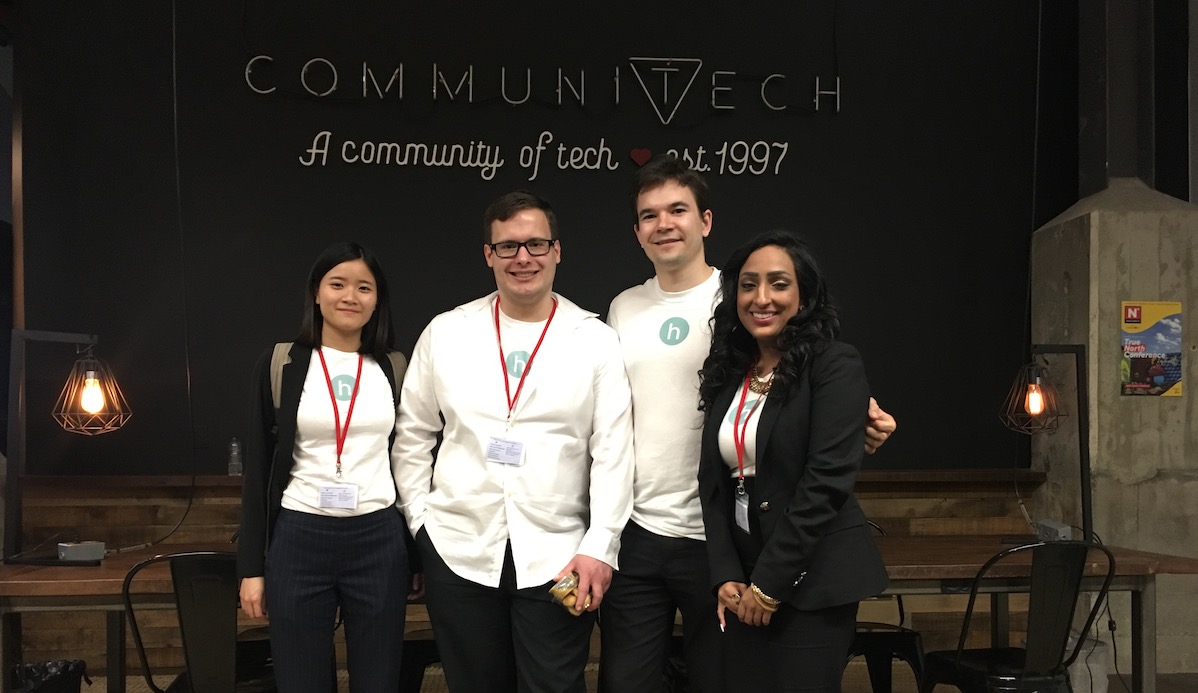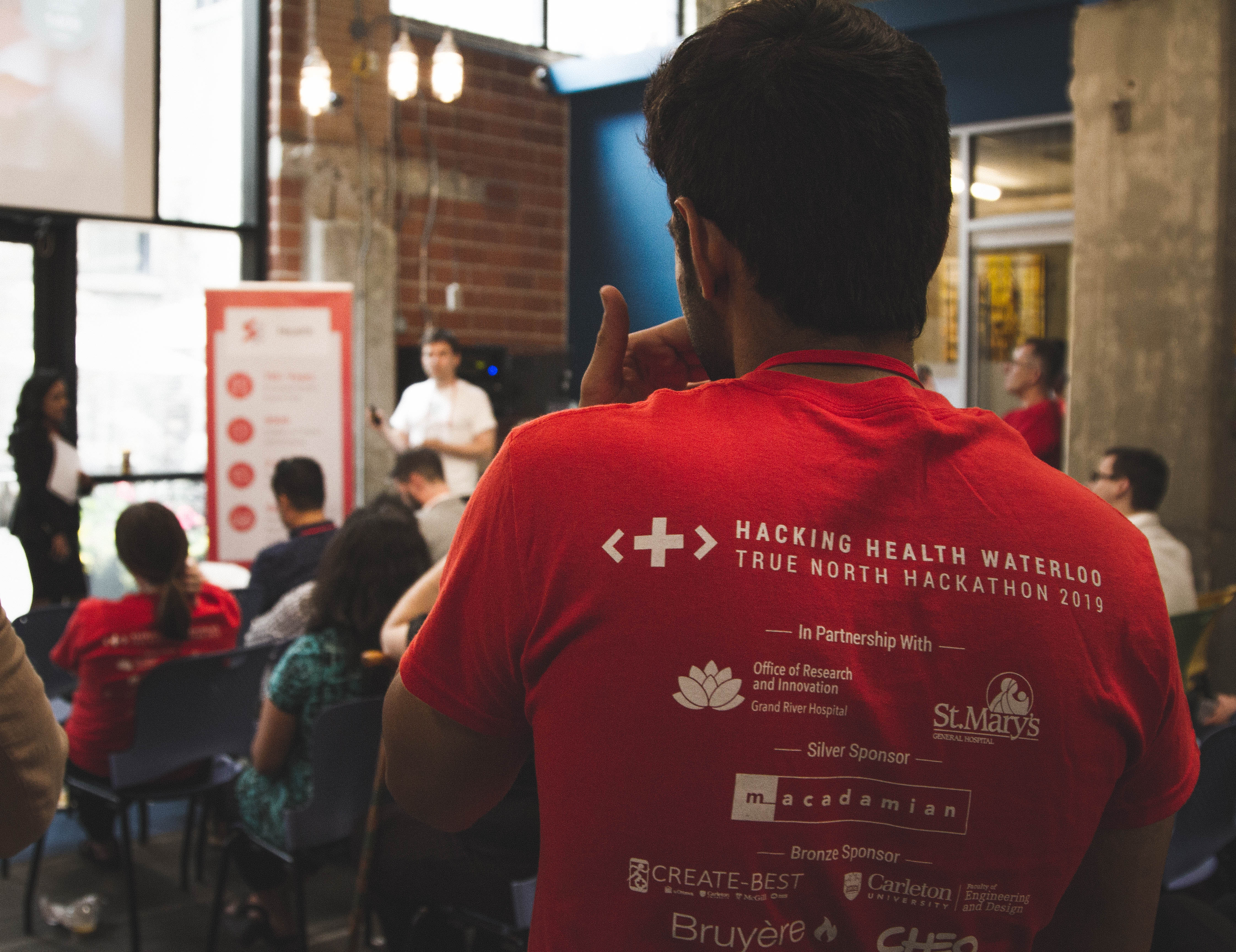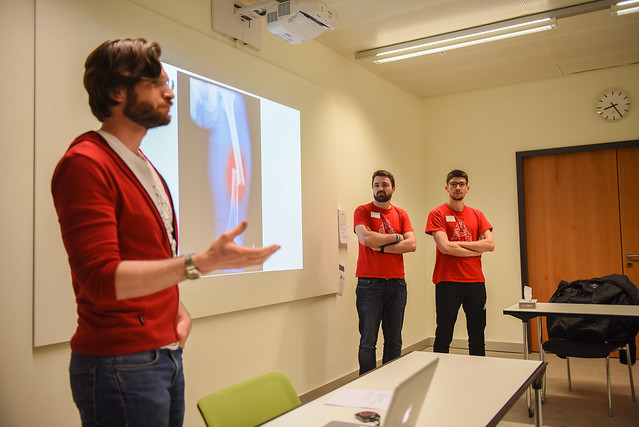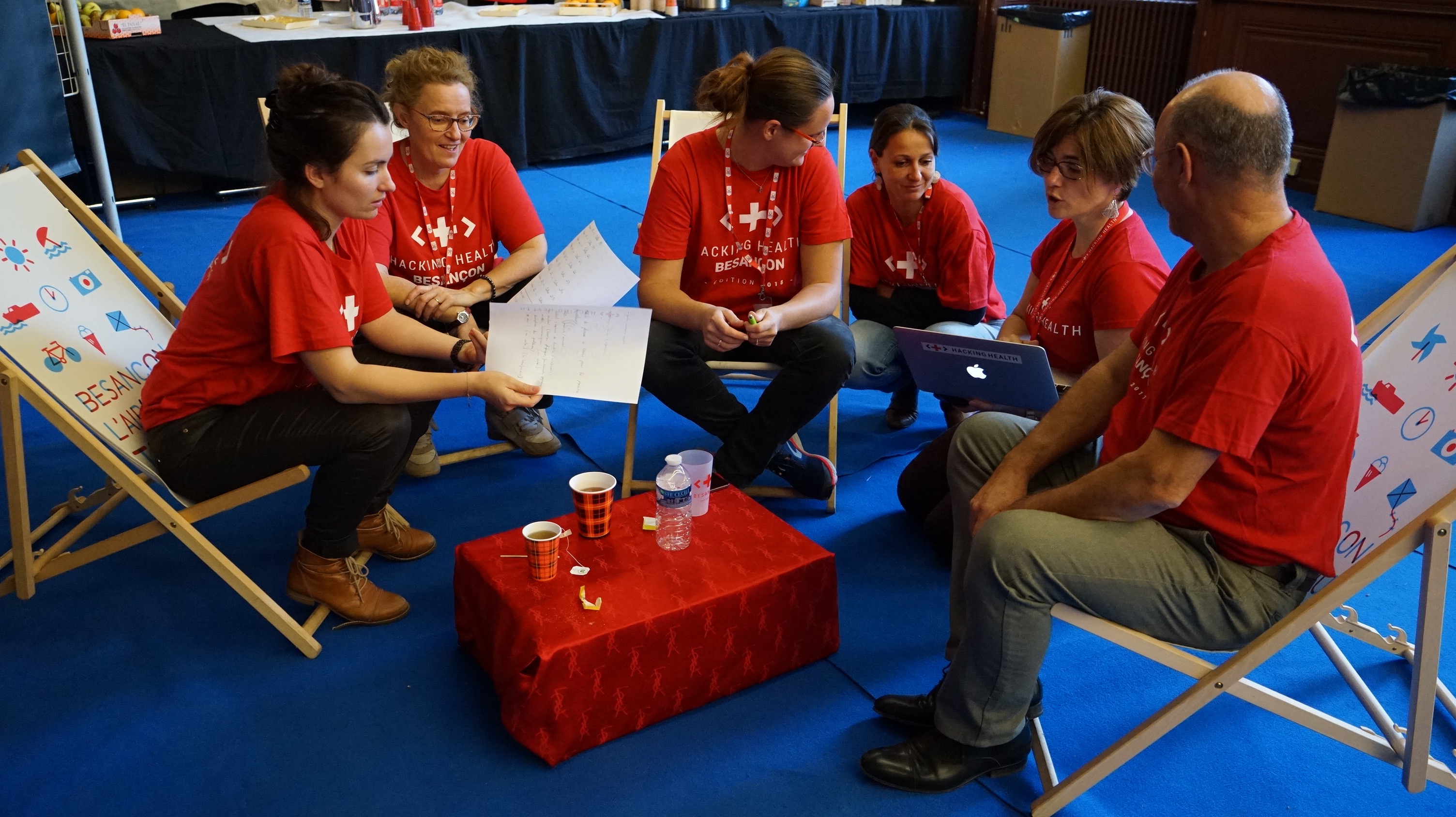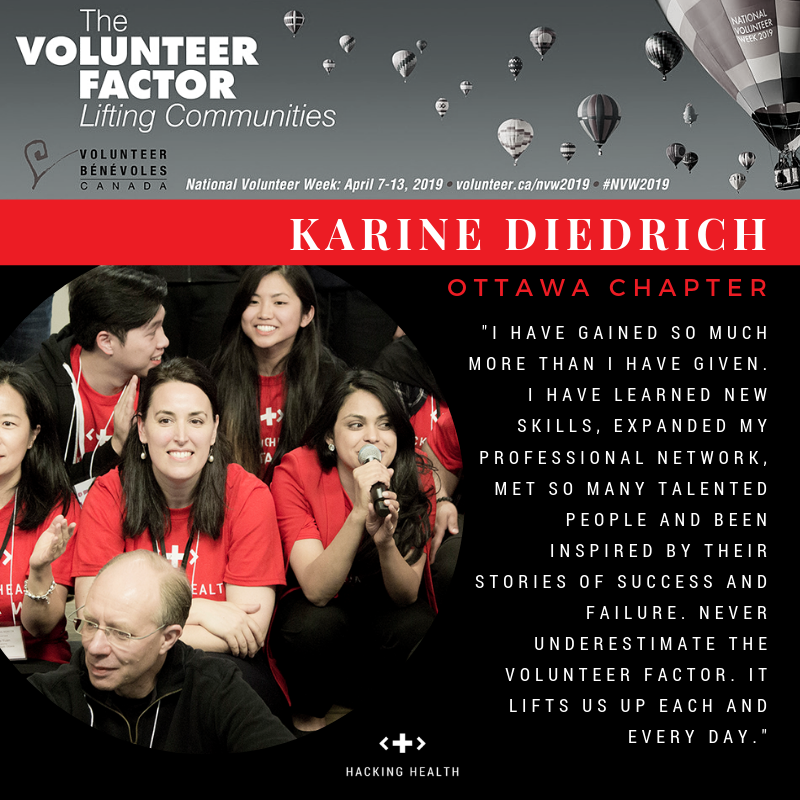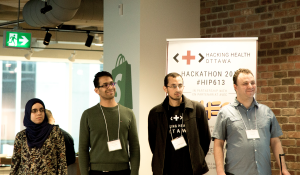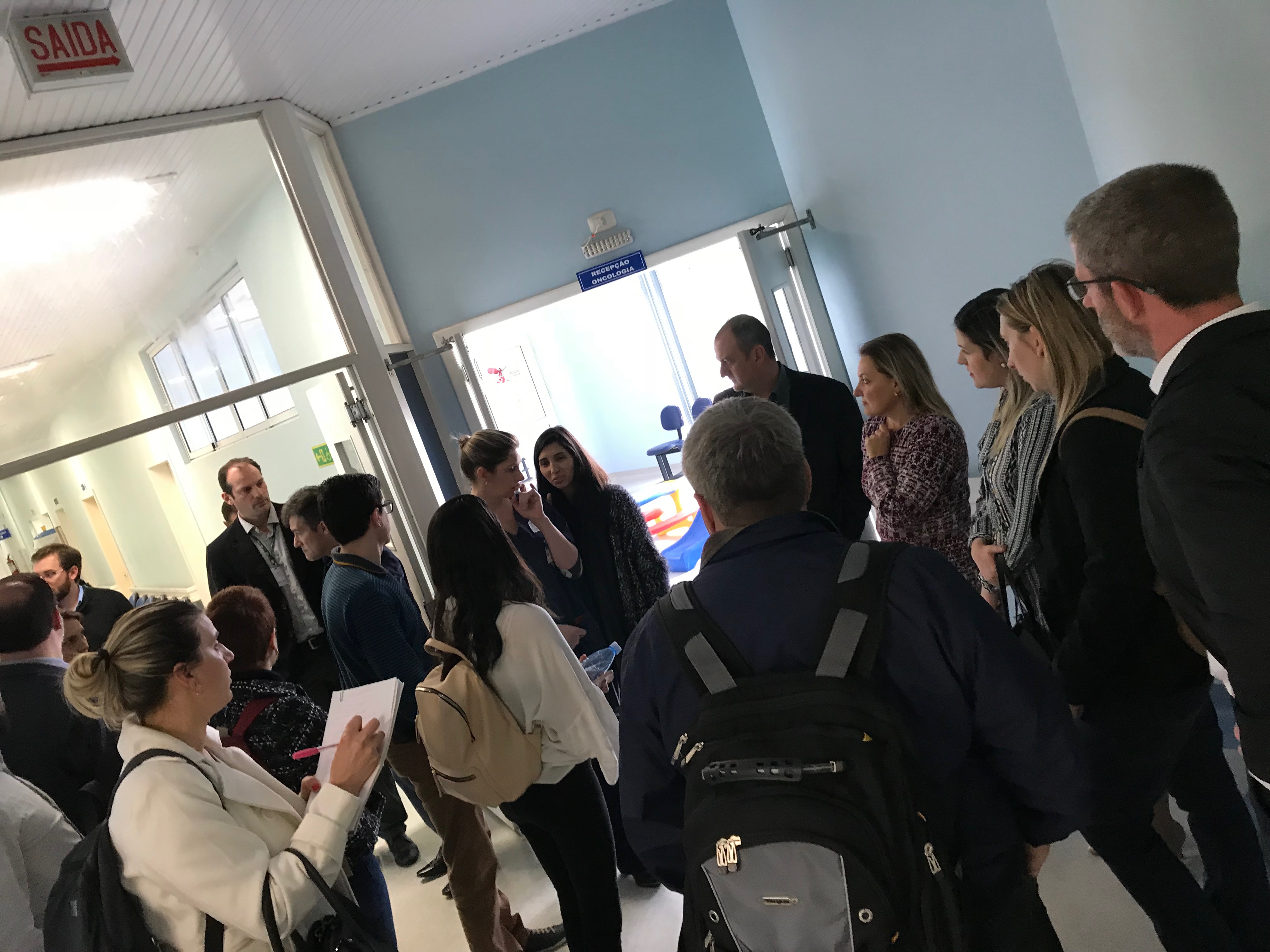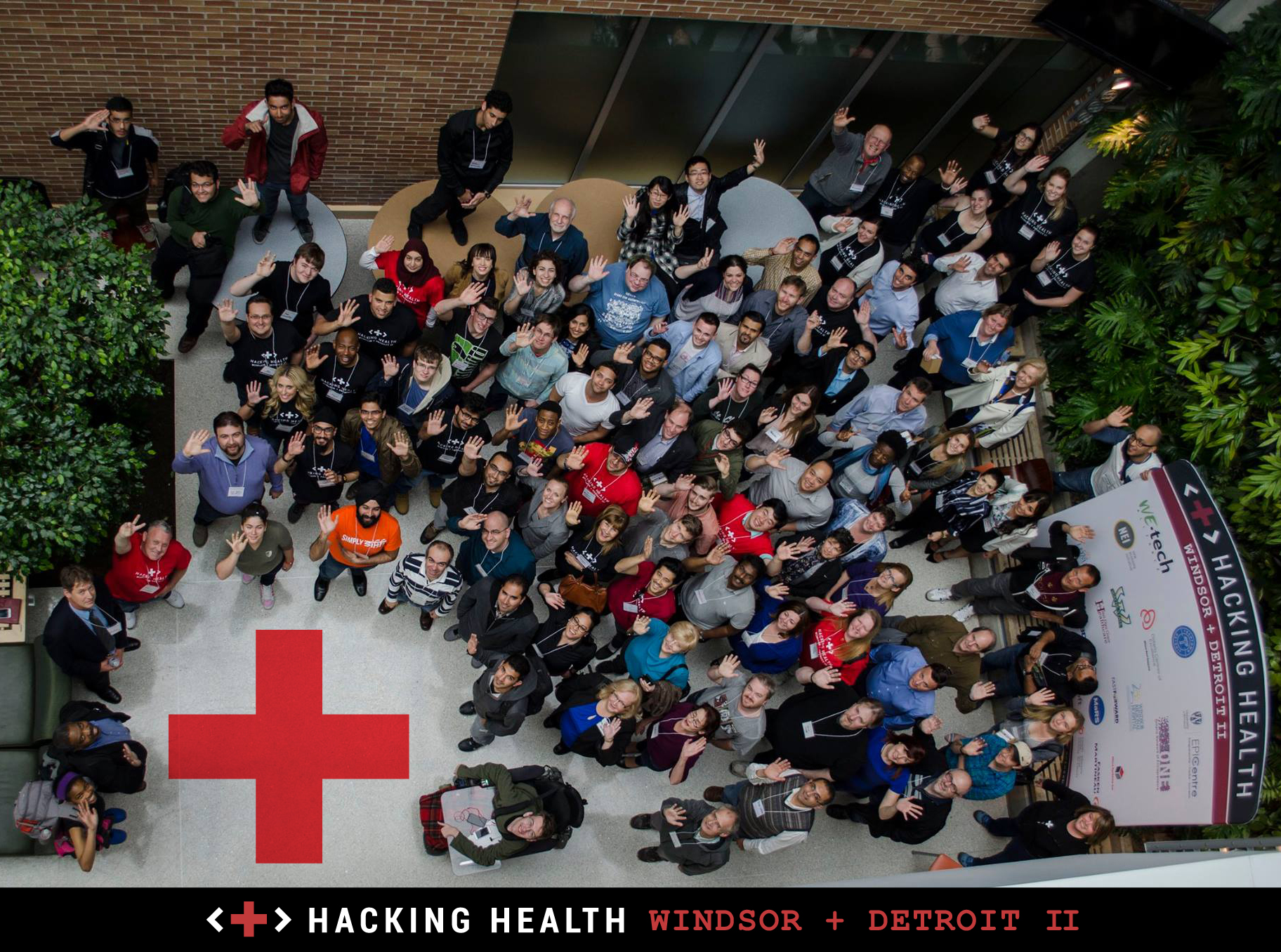Chapters
The Waterloo Region’s Connector
In Canada, Kitchener-Waterloo is often described as the Silicon Valley of the North as an incubator for technology. Despite the accolades, we operate within a fragmented health tech siloed ecosystem. Waterloo Region has many incredible incubators, entrepreneurs, research bodies, and healthcare systems. Yet, inefficient communication leads to duplication and missed opportunities for growth.
Our vision for Hacking Health Waterloo is to be the recognized connecto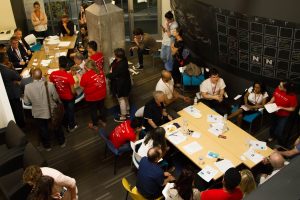 r for health tech innovation and improvement in the Region. We facilitate or enable conversations. We endeavour to create a bridge and conduit for more than 1,000 members to seek help and explore the unmet needs in health.
r for health tech innovation and improvement in the Region. We facilitate or enable conversations. We endeavour to create a bridge and conduit for more than 1,000 members to seek help and explore the unmet needs in health.
Our vision is to be the recognized connector for health tech innovation and improvement in the Region.
Kitchener-Waterloo is bustling with health tech-related conferences and Hackathons. Through 2018, these included Hack4Health 4.0 at St Paul’s Greenhouse, Waterloo MedTech conference and an AGE-WELL workshop on technology solutions to social isolation in older adults. May’s True North conference at Lot42 attracted more than 2,000 delegates considering Tech for good. Transformative innovation starts by connecting technology creators, healthcare professionals, and health consumers across the Waterloo Wellington Local Health Integration Network (WWLHIN).
Acting as a regional connector extends behind the geographic boundaries to plug the local community into the broader Ontario and Canadian health tech ecosystem. To that end, the Hacking Health Waterloo members have participated in the Hacking Health Ottawa HIP613, Hacking Health Toronto Ideathon, and new Hacking Health YGK chapter (Kingston, ON).
We can learn from each other through the Hacking Health network.
We have work ahead of us to engage more clinicians and engage patients to collaborate on realistic, human-centric solutions to front-line problems. We can learn from each other through the Hacking Health network. There are few situations that one of the other chapters have not previously encountered.
I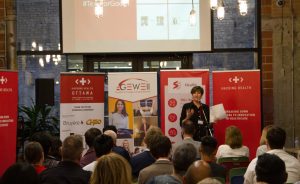 t has never been easier to start a business says HubSpot, while at the same time acknowledging that scaling a business is becoming harder than ever. Anthony Lacereva notes that Canada is possibly the best place to start a business and the hardest place to grow one. An exemplary illustration is the HHOttawa HIP613.
t has never been easier to start a business says HubSpot, while at the same time acknowledging that scaling a business is becoming harder than ever. Anthony Lacereva notes that Canada is possibly the best place to start a business and the hardest place to grow one. An exemplary illustration is the HHOttawa HIP613.
In 2019, Hacking Health Waterloo has collaborated with the Regional Innovation Centre, Communitech, for a hackathon in conjunction with True North. This event has engaged local health players while inviting partners from across Ontario. The theme was focused on Aging, Social Isolation, and Health. More details about this dual-city hackathon will be shared in a future post.
Our hackathons, therefore, must not just create the best ideas but provide a journey to scale profitable growth.
—–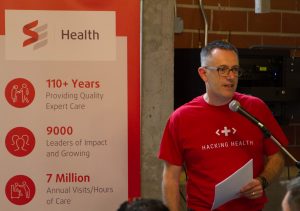
About the author: John Gregory is Partner Lead of the Hacking Health Waterloo chapter and Head of Global Growth at the Hacking Health Foundation.
Swiss Hacking Health: The Secret Of An Amazing Longevity
After five successful editions, Arkathon, the Hacking Health Switzerland-Valais‘ hackathon is one of the most important health hackathons in Switzerland. A must for the country’s disruptive minds!
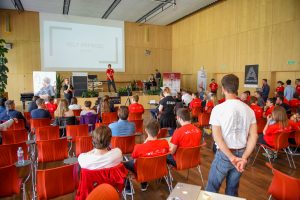 How does such an event work? Immersed in a medical facility over a weekend, participants meet with health professionals and patients to develop innovative solutions to solve their health challenges. At the end of these 48 intense hours, the objective is to present a jury of experts concrete digital solutions to address health issues. Each year, the three winners are followed by an acceleration program offered by The Ark Foundation and Swiss Digital Health.
How does such an event work? Immersed in a medical facility over a weekend, participants meet with health professionals and patients to develop innovative solutions to solve their health challenges. At the end of these 48 intense hours, the objective is to present a jury of experts concrete digital solutions to address health issues. Each year, the three winners are followed by an acceleration program offered by The Ark Foundation and Swiss Digital Health.
>> Discover the after movie of the last Arkathon’s edition
A robust ecosystem: a work over the years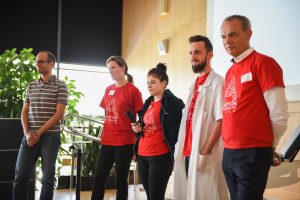
In the tradition of Hacking Health’s events, Arkathon infused its spirit of innovation and create strong synergies between very diversified stakeholders: academics, institutes and health professionals, patient associations, industry, start-ups,… Partnerships have been created over the years between the actors of digital health innovation: The Ark Foundation, Swiss Digital Health, the Clinique Romande de réadaptation, the Valais hospital site, the HES-SO Valais/Wallis, EPFL Valais/Wallis, GRIMM, the Institut de Recherche en réadaptation, etc.
>> Discover the interviews of the jury about the last Arkathon’s edition
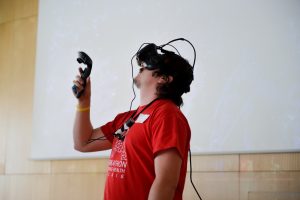
“This type of events accelerates projects and immediately detects their technical feasibility and economic potential,” explains Sébastien Mabillard, organizing member of Arkathon HH Switzerland – Valais. ” For the past 5 years, acceleration programs have been offered to hackathon winners by Swiss Digital Health and the Ark Foundation. It’s a way to get these nuggets to market quickly. Our objective is to encourage the emulation of projects with our partners and to support solution providers to “feed” the innovation cluster with viable prototypes to quickly respond to the needs of the field. “
Many success stories around the Arkathon of Hacking Health Valais
Recently, a start-up company, Transcend, created by three Valais computer science students, has developed an innovative training tool for high-tech rescue, based on virtual reality technologies. Another hat off to the start-up Eyeware, which has just raised a significant sum of €1.9 million for its eye-tracking system. These two solutions have hatched during previous editions of the Arkathon and are now shining on national and international markets!
>> Discover the interview of three winners’ teams of the last Arkathon’s edition
Join the community and hack tomorrow’s health !
Curious about our event? Do you want to participate in the 2020 edition and contribute its extraordinary longevity with us? Click here to find more information.
Our team of 4, Sébastien Mabillard, Nadia Mottier, Joël Rossier and Frédérique Décaillet, is looking forward to welcoming you to the Valais Alps!
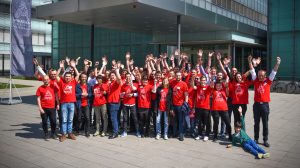
Hacking Health Hackathon, by Besançon (France)
—– Retrouvez l’article original en français —–
On October 2018, the Hacking Health chapter of Besançon organized its second health hackathon (open innovation marathon). This event confirmed the enthusiasm raised by the first edition, and highlighted three strong trends: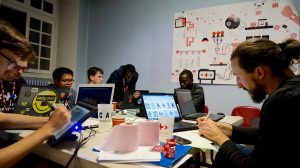
– A vast majority of students participated in the marathon: 75% of the 309 participants came from the local university or the “grandes écoles” (renowned engineer and business schools). This massive mobilization of students generates extraordinary energy, creativity, and generosity.
– The expertise of the local ecosystem is well represented: Microtechnology and miniaturization, a specialty inherited from the watch industry of which Besançon is a leader. Thus, many highly skilled engineers have joined teams composed of digital developers, electronic specialists, and designers.
– An important fablab (Fabrication Laboratory) gathering all the material and human resources of two fablabs and two engineering schools allowed to prototype operational devices in less than 48 hours.
extraordinary energy, creativity, and generosity
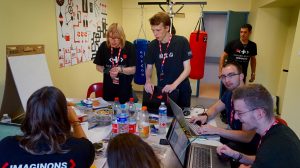 In this context, all the 24 health professionals and patients who came to pitch their issue have found a team. No team gave up during the weekend, and the quality of the solutions was terrific. This may explain that, two months after the marathon, two project holders are about to create their startup. Since this cannot be done overnight, we created a 3-month incubator program after the hackathon to assist teams in the maturation of their projects and help them connect with the right partners.
In this context, all the 24 health professionals and patients who came to pitch their issue have found a team. No team gave up during the weekend, and the quality of the solutions was terrific. This may explain that, two months after the marathon, two project holders are about to create their startup. Since this cannot be done overnight, we created a 3-month incubator program after the hackathon to assist teams in the maturation of their projects and help them connect with the right partners.
Another novelty in 2018: the creation of a showroom, in parallel with the innovation marathon. Seventeen French and Swiss Hacking Health project leaders came to present their innovation to the public, share their experience, and expand their network.
Join the 2019 hackathon in Besançon
– Or find the nearest Hacking Health event –
Would you like to participate in the 3rd Open Innovation Marathon of Health in Besançon? Would you enjoy prototyping solutions to respond to real problems posed by health professionals and patients? What about an exciting and entertaining weekend based on cooperation and exchange?
Join the Hacking Health hackathon in Besançon from 18 to 20 October 2019 and imagine tomorrow’s healthcare solutions!
———- Author: Christophe Dollet, Leader of the Hacking Health chapiter in Besançon and Coordinator of France-based chapters. Christophe works at Smart City, a project of the city of Besançon.
Watch this video to get a feeling of the 2018 hackathon in Besançon.
The Volunteer Factor
I joined the Hacking Health Ottawa (HHO) chapter in August 2016. I was working in health at the time and looking for new ways to bring together diverse stakeholders. I came across a post on Twitter about this thing called a Hackathon, and it was focused on health. I reached out to learn more and was invited to the chapter team meeting and a smaller event they had coming up. It was a great way to learn about Hacking Health, the people who make it all happen, and the work they do.
I came across a post on Twitter // I reached out to learn more
Throughout those first few weeks, I met students and professionals of all ages working in health, design, engineering, business, and government. The diversity of event participants was reflected in the make-up of the HHO team. The quality of speakers, engagement of participants and dedication of the chapter’s volunteers was inspiring. I still didn’t really understand what a developer did or how ‘ideation’ was different from ‘brainstorming,’ but it didn’t matter.
This was a learning journey, and it culminated in a three-day event each year called a hackathon, where a DJ is a must, energy is contagious, and people don’t want to leave (seriously…we had to kick people out at the end of each day).
There is always a moment during our events where someone realizes HHO is 100% powered by volunteers.
There is always a moment during our events where someone realizes HHO is 100% powered by volunteers. Even though we 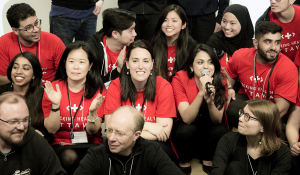 thank and recognize our volunteers at the beginning and end of every event, it can often take folks a few events for it to really sink in. Their eyes light up, and they can’t believe it. You do all this in your spare time the say. Yes, we do. We work with amazing, dedicated people who show up, roll up their sleeves and make the impossible possible year over year. I can’t thank our team of volunteers enough for their generosity and commitment to HHO.
thank and recognize our volunteers at the beginning and end of every event, it can often take folks a few events for it to really sink in. Their eyes light up, and they can’t believe it. You do all this in your spare time the say. Yes, we do. We work with amazing, dedicated people who show up, roll up their sleeves and make the impossible possible year over year. I can’t thank our team of volunteers enough for their generosity and commitment to HHO.
As a volunteer myself, I have gained so much more than I have given. I have learned new skills, expanded my professional network, met so many talented people and been inspired by their stories of success and failure.
Never underestimate The Volunteer Factor. It lifts us up each and every day.
My learning journey continues, and I am grateful for all those who have and continue to make HHO a reality. The volunteers, the community, the health care partners and the sponsors. Thank you.
—-
Karine Dietrich is Partnership & Sponsorship Lead at the Ottawa Hacking Health chapter. She’s also Vice-President, Public Engagement and Knowledge Mobilization at Volunteer Canada, and owns a B.A. in Criminology with a concentration in law from the Carlton University.
Patient Safety & Mental Health of Professionals
Patient Safety – Medication Mistakes was the focus of the 2019 Hacking Health hackathon in Espirito Santo (Brazil). This is my third year as a volunteer with this movement. In previous years, I had the opportunity to participate in the discussion on the following topics:
– Prevention of chronic diseases;
– Public health lack of money or management?
– Challenges of an aging population

During these three years, I have participated in several events with health professionals (public, private, philanthropic), entrepreneurs, managers, designers, technology personnel, and famous makers. If you’ve never attended a Hacking Health event, I highly recommend it! Excellent ideas and prototypes arise and benefit the whole community.
Something caught my attention since the first edition I participated, no matter the environment (public health, private health, with and without structure). In all issues, the mental health of health professionals has surfaced. I have heard talks like:
“… It is useless having the most advanced technology if we are not motivated …”
“… As long as we are not treated with respect by our hierarchy, it is difficult always to be well to take care of our patients …”
“… Having 3 jobs and turning on duty can not decorate protocols …”
 I am a psychologist with a specialization in mental health, and I have had the opportunity to develop my career in the public service (Family Health Program, Caps, Hospita gerall, etc.) and part in the private sector. And as it happened during a Hacking Health event, I pulled back memories and realized that this same discussion in the work environment is generally avoided.
I am a psychologist with a specialization in mental health, and I have had the opportunity to develop my career in the public service (Family Health Program, Caps, Hospita gerall, etc.) and part in the private sector. And as it happened during a Hacking Health event, I pulled back memories and realized that this same discussion in the work environment is generally avoided.
The challenge of our 2019 hackathon is about reducing medication errors. And the obvious question must be asked:
What if health professionals’ mental health is correlated to medication errors?
And this question is international. In the US, according to the Robert Wood Johnson Foundation Interdisciplinary Nursing Quality Survey (INQRI), nurses experience depression at twice the rate of the general public. Depression affects 9% of ordinary people, but 18% of nurses experience symptoms of depression.
Ironically, health professionals, for many reasons (fear of losing their job, fear that the team considers them unbalanced, fear of showing weakness, etc.) are slow to identify that they are not doing well mentally. They usually attribute discouragement, lack of motivation, or concentration to the fact that they are overwhelmed or lack resources in the work environment, or even lack of appreciation or recognition.
They invented a name for this: Burnout Syndrome
Translated literally means burned out completely, it is a generalized exhaustion.
In the mid-1970s, the first studies appeared in the United States, identifying “burnout” as a syndrome manifested by the exhaustion experienced by workers as a consequence of negative experiences at work. The symptoms are very similar to stress.
However, burnout is always related to a work complaint that may derive from chronic and prolonged stress. Stress is transient, and burnout is continual stress where one is more and more exhausted. Studies show that the psychological profile is of a professional who is often competitive or likes everything right, with a tendency to be a perfectionist, among others. After the illness is established, it is common for the professional to present a lack of involvement with work, chronic stress, insensitivity to others, irritability, and irony towards co-workers.
And what are companies doing to prevent this from happening?
Throughout the year, I hope that Hacking Health promotes conversational wheels and clinics with managers, specialists in the area of People Management for the exchange of successful experiences in this sense. How much damage may occur if we do not take any action at all? For example, by taking care of the mental health of the healthcare professionals, would this not have a direct effect on the quality of the patient’s care? And may reduce the hospitalization time? – which has a direct impact on healthcare costs. 
Sooner or later (hopefully sooner) entities will have to have this debate. But we are talking about health of individuals and we should not delegate our health and well-being to others. Yes it is necessary to deal with the day to day and demands, but everything is crystal clear: To be sick and/or exhausted or be hospitalized a little does not matter, the world will continue to turn.
We need to be our #1 priority.
Health professionals need this mental health care, and many do not admit they need it because they are in the role of caregivers. Talk about their experiences, what they feel, the possible causes, to be able to take care of the other without harming the productivity of their team.
By failing to address the issue we put the patient’s life at risk, that of the professional, and we miss the opportunity to guide and improve on Mental Health besides reducing the stigma, prejudice, and discrimination that exists.
We have a long journey ahead and need to learn a lot because there is no immediate revenue, but everything starts with a simple action:
Start talking about it!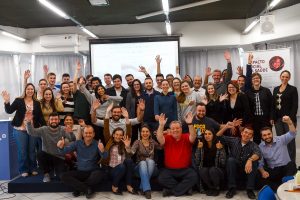
About the author of the Post:
Alessandra Fischer is a volunteer at Hacking Health Brasil and the first leader at the Santa Catarina chapter. 25 years of development of actions related to Public Health more specifically in Mental Health with passages by the Municipal Health Secretariat Joinville. Zerbini Foundation, SPDM, and Joinville Regional Hospital. In these places, he had the opportunity to develop several actions from the reception, therapeutic support to patients and relatives, brief therapy and coordination of therapeutic groups
Pictures by Gustavo RPS.
Dutch Hacking Health: It’s All about the Mix (Janssen BeNeLux)
Making a breakthrough in the health care sector in just three days: It seems like an almost impossible task. And yet this is exactly what Dutch Hacking Health—an event that really can accelerate innovation—aims to achieve! The fourth Dutch Hacking Health was held in the first two weeks of April, with health care hackathons organized in five cities (Amsterdam, Maastricht, Nijmegen, Rotterdam, and Utrecht). I am proud to be contributing to the event on behalf of Janssen.

Creative Solutions
A hackathon works a little like a pressure cooker. For three days, driven, multidisciplinary teams work toward finding a solution to a challenge in the health care sector. On the last day, they present the end result to a local jury. The worlds of designers, IT specialists, health care professionals, and patients come together to create a fascinating mix.
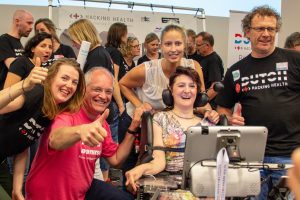
With his bright red tee-shirt, M. Erik Gerritsen, Secretary-General of the Dutch Ministry of Health, Welfare and Sport, is a fervent supporter of the Dutch Hacking Health ecosystem.
A hackathon starts with a specific problem. For example, how do you as a patient or a relative of a patient stay on top of what is going on during a hospital stay? Often, it can be difficult to form a complete picture based on the fragmented information you receive from nurses or doctors. Sometimes it can feel like you’re no longer in control. During Dutch Hacking Health 2018, this challenge was successfully addressed by a team at Bravis hospital. Since then, software company ChipSoft and the hospital have been working together to put the improved Mijn Zorgteam patient portal to the test. This is a result that will directly benefit patients and their relatives.
This year, Dutch Hacking Health will focus on specific themes at various locations. Participants in Nijmegen will tackle challenges relating to future-proofing the labor market in the health care sector and local health care provision. In Utrecht, personalized care is top of the agenda. Amsterdam will look at a mix of topics, including delivering the right care in the right place, as well as mental health. Rotterdam and Maastricht have opted for an open format, where participants will be able to look at challenges relating to various topics.
Janssen’s Role
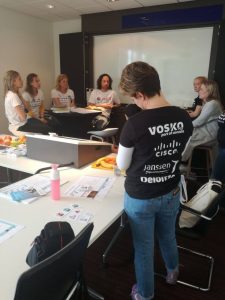
Sponsors’ logos are displayed on all tee-shirts
Innovations that arise from a hackathon or start as an initiative within a hospital can often also be implemented in other hospitals. By looking at these kinds of innovations with the right partners from industry, we can generate additional power to give high-potential innovations that extra boost. Janssen is keen to play a role in this process. With our broad portfolio of innovative medicines, we see it as our responsibility to work together with hospitals, patient organizations, and, for example, tech companies to accelerate the learning process that’s involved in health care innovation and, through these partnerships, to contribute to improving the Dutch health care sector. With this goal in mind, Janssen has this year become a proud national partner of Dutch Hacking Health for the first time, alongside Deloitte, Vosko, Cisco, and the Dutch Ministry of Health, Welfare and Sport.
As a project manager, I will support the organization this year by helping to coordinate the local hackathons at a national level — which will be a great challenge! In the future, we also want to work with the various local organizers and national partners to create a more professional and sustainable national organization.
“With our broad portfolio of innovative medicines, we see it as our responsibility to work together with hospitals, patient organizations, and, for example, tech companies to accelerate the learning process that’s involved in health care innovation”
I know from my own experience how much positive energy there is buzzing around during health care hackathons. You work together with teammates from a wide range of backgrounds and truly learn about the people behind a specific challenge. This way of working helps you produce some truly creative and fitting solutions. At the hackathons, I met people with the same passion. Everyone puts all their effort into coming up with a solution to a challenge instead of focusing on problems. I brought this positive energy back with me when I returned to Janssen. Inspired by last year’s hackathon, I now focus even more on the person/patient in my day-to-day work.
Dutch Hacking Health 2019
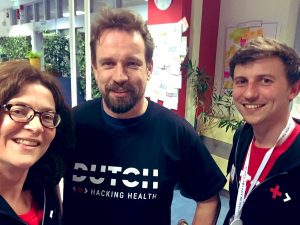
Hacking Health Nijmegen organizers: Concha van Rissjel (left) and Robin Hooijer (right)
Early April is when it all begins: In Amsterdam, Maastricht, Nijmegen, Rotterdam, and Utrecht, a series of hackathons will take place over two weeks. At each event, you can see on a small scale what we need to do on a large scale to accelerate health care innovation in the Netherlands and to maintain affordability. To sum it up: It’s all about working together. If we take the time to really understand a problem and leverage each other’s strengths, I am convinced that we can find even more innovative and patient-focused solutions.
On our shared journey to the health care of the future, it’s all about the mix.
If you’re curious about the power of the health care hackathon, why not join in? More information about hackathons in the Netherlands can be found here. Click through to the various locations and sign up in your favorite city.
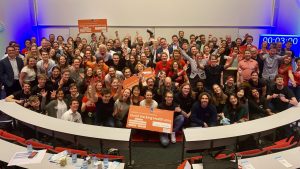
Original text from Sander van Nuland, Project Specialist, Janssen BeNeLux

Our Volunteers Break Silos And Borders
Hacking Health Windsor-Detroit is the first cross-border Hacking Health chapter in the world. It brings together two cities, which comprise a world-class automotive cluster that is reinventing itself as a global leader in health and mobility.
 The 100-year-old Ambassador Bridge is iconic of this chapter’s determination to reach across divides and bring creative people together from the tech, health and automotive sectors to collaborate on innovative solutions to healthcare challenges on both sides of the Detroit River.
The 100-year-old Ambassador Bridge is iconic of this chapter’s determination to reach across divides and bring creative people together from the tech, health and automotive sectors to collaborate on innovative solutions to healthcare challenges on both sides of the Detroit River.
This chapter fosters innovation across the Canadian-US border
Now entering its fifth year – Hacking Health Windsor-Detroit has drawn over 1,000 participants, connected over 60 partner organizations, sparked a half-dozen start-up companies (CarePRN is one of them) and inspired a cross-border MedHealth Summit that annually matches health start-ups with investors .
There is also Kaitlyn Sheehan—a Registered Nurse— who had an idea for a mobile app that could improve health care on both sides of the Detroit-Windsor border. Read her fabulous story here and how she won a hackathon top award for mobile app design in this previous post.
Gathering automotive & healthcare sectors in the same place?
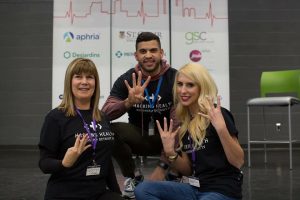
From left to right: Deborah Livneh, Zain Ismail and Yvonne Pilon, members of the HHWD chapter
After the lights dimmed on a successful MedHealth Summit in downtown Detroit in early 2018, one that featured an electric keynote by celebrated neuropathologist Dr. Bennet Omalu featured in the movie Concussion, the organizers gathered in a boardroom at the Eugene Applebaum College of Pharmacy at Wayne State University. Many of those gathered had been founders and leaders from Hacking Health Windsor-Detroit – which provided the spark for the Medhealth Summit.
In part, the organizers wanted to debrief on such a successful meeting and chart potential destinations for Medhealth in 2019. This meeting raised the potential of bringing talent from the automotive and health-care sectors together.
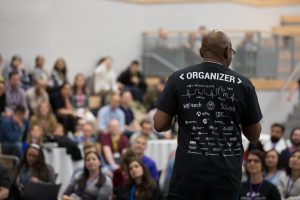
A year later, we are happy to report that Hacking Health Windsor-Detroit IV will explore the theme of mobility in the fall. The potential for creative engineers and programmers from General Motors and Google and Lyft to talk healthcare is exciting.
In the video below, Robert C. Brooks, III – a hackathon participant, talks about what the automotive industry can bring to healthcare:
Our Movement Builds Ecosystems of Innovation
At the Medhealth Summit debrief, Stephen Konya, a Senior Innovation Strategist from the Office of the National Coordinator for Health IT with the United States Department of Health and Human Services, was invited to lead a discussion. He is exploring the growing network of health-related cluster initiatives across the United States – a cluster of clusters – and the opportunity to integrate the MedHealth Summit.
And that is the genius of Hacking Health – connecting thought leaders from health and tech regionally, opening up promising collaboration between previously sequestered sectors and looking beyond the horizon to connect creative problem solvers globally. That’s Hacking Health’s approach.
That’s the magic of a grass-roots movement
Want to support our movement? Join/build your local chapter or make a donation!
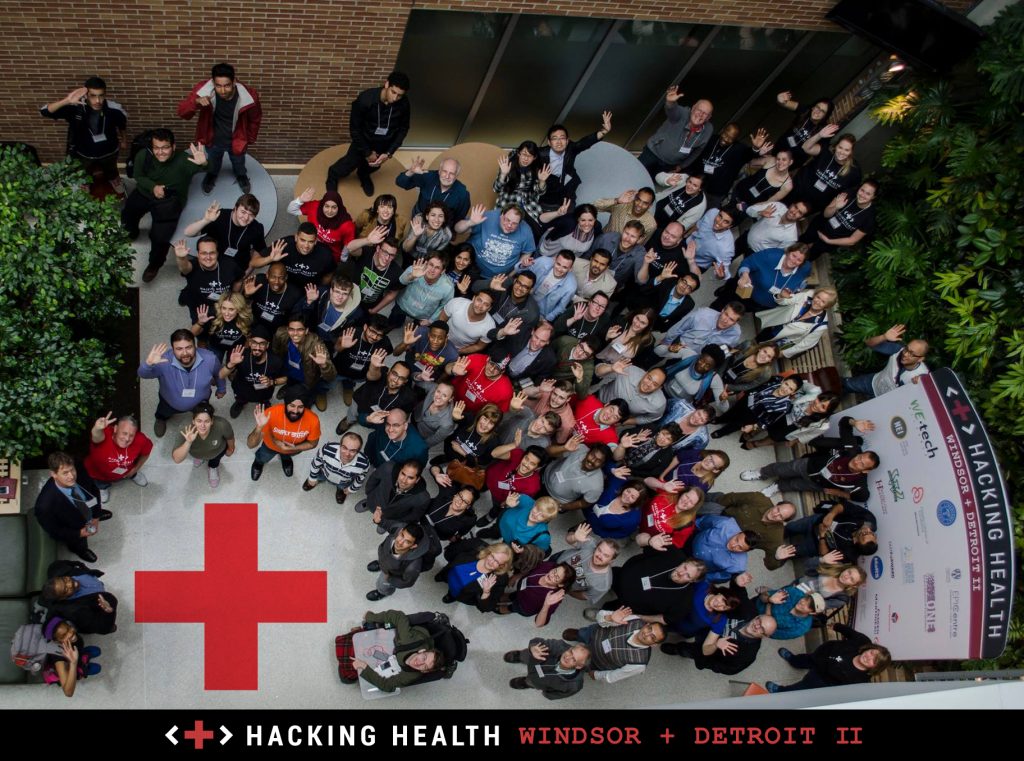
Original text from Dr. Irek Kusmierczyk,
City Councillor for Ward 7 in the City of Windsor
Director of Partnerships at WEtech Alliance
Leader of the Hacking Health Windsor-Detroit Chapter
Hacking Health, Innovation Beyond Hackathons
Hacking Health is a not-for-profit organization created in Montreal in 2012 with head office at the CHUM Hospital. We have developed 12 entities across Canada (from Vancouver to St-John’s) and are present in 50+ cities around the world. All these entities (called chapters) are built by multidisciplinary teams of volunteers who want to bring innovation to healthcare and integrate new technologies for the benefit of patients.
All over the world, our 600+ volunteers organize high energy, collaborative competitions such as health hackathons. During these events, we pair healthcare professionals with patients, technologists, designers, entrepreneurs and other experts to build concrete solutions to healthcare challenges – see all future and past events here.
Listen to the interview of Annie Lamontagne, Special Projects Advisor and former Head of Global Growth at Hacking Health.
Listen to the podcast on iTunes, Podbean, Stitcher or Youtube.
From fun short events to transformative innovation hubs
The cornerstone of Hacking Health’s global success is the community built in each location. Chapters organize not only one-time weekend hackathons but also meetups and workshops which work as a regular forum for ideation, knowledge exchange, and networking opportunity.
“Not each idea born during a hackathon turns into a company, nor do all participants have entrepreneurial aspirations, but people always make new connections and acquire new knowledge,” says Annie.
Hospitals, like CHUM, partner with Hacking Health with the desire to give medical professionals a different perspective on their problems with the opportunity of building tomorrow’s healthcare. Read the press release about our collaboration with CHUM here.
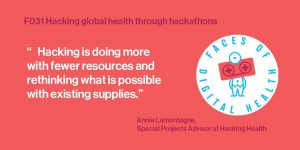
Health innovation management
As Annie likes to emphasize in the interview, health innovation management is an emerging and evolving science, and even when hospitals are open to new ideas, they might struggle in implementing them into their practice.
“At one time a speech therapist designed a solution for her clinical practice. She did not want to start a company but wanted to see her idea used in her everyday work. Before that was possible, she hit a lot of barriers inside the institution and had to put a lot of effort in justifying the legal requirements, get management approval, etc., to be able to use the solution,” says Annie Lamontagne.
Another successful hackathon participant was Dr. Denis Vincent, an Edmonton-based physician, who suffered a loss of a patient due to a misplaced fax document. He started looking for a solution to prevent such things from ever happening again. At the Hacking Health Edmonton hackathon in 2013, Dr. Vincent created ezReferral, a cloud-based, secure medical referral management tool that keeps all parties on the same page: family doctor, specialist, and patient.
Read other success stories: CarePRN, IUGO Care, EyeWare, Haleo, etc. Just to name a few.

Hacking health uses different approaches for attracting participants from the clinical practice to join the events. One of them is to turn to IT departments inside healthcare institutions to identify the healthcare workers who complain the most. Hacking health sees them as champions — they are those who refuse to accept the status quo and wish to see changes. They usually become the most influential ambassadors of innovations within institutions.
One of the aspects Annie is passionate about is rethinking the inclusion of older healthcare specialists in the innovation processes. “These are people with tremendous knowledge and experience, still wish to be active, and we need to value their participation.”
Some questions addressed during the interview:
- How are hackathons in healthcare evolving over the years?
- Hacking Health is active in 17 countries. What can different chapters learn from each other?
- How to organize a hackathon?
- How to motivate participants to join hackathons?
- How do Hacking health events differ from other digital health events and how do they attract participants?
- How do hackathons in hospitals look like?
- What follows hackathons in clinical settings? Do hospitals adopt change management solutions?
Post in collaboration with Tjaša Zajc, author of Faces of Digital Health

